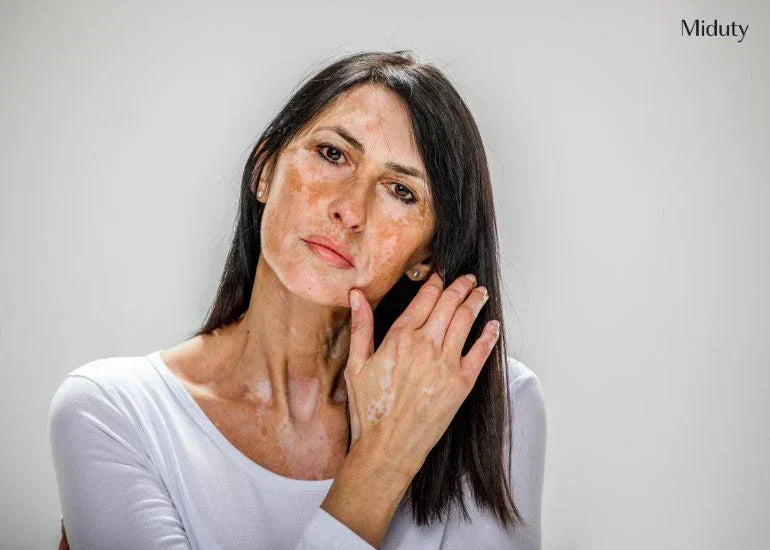
Essential Skincare for Sensitive Skin: Recommended Solution To Protect And Nourish Your Skin
Introduction:
According to a study published in the International Journal of Cosmetic Science, approximately 60-70% of women and 50-60% of men report having some degree of sensitive skin. Additionally, environmental factors such as low humidity and temperature can compromise the skin barrier, increasing susceptibility to irritation.
In this article, we’ll explore the common causes and symptoms of skin sensitivity and the best skincare routine for sensitive skin - so you can strengthen your skin’s natural defenses.
Key Takeaways:
1. Shield Your Skin with ExpoZen & Ferulic Acid Serum: Unlock the power of ExpoZen and ferulic acid serum to protect your sensitive skin. These dynamic ingredients work together to fight free radicals, reduce irritation, and help strengthen your skin's natural defense.
2. Unmask Your Skin's Triggers: Know what's really causing the irritation. Learn how factors like pollution, stress, and harsh weather can affect your skin-and how to fight back with the right skincare routine.
3. Sensitive Skin Routine 101: Create a customized skincare routine that doesn't just soothe but actively nurtures your sensitive skin. It's time to pamper, protect, and rejuvenate-without the flare-ups.
4. Choosing the Right Products is Everything: The secret to keeping sensitivity at bay? Products that protect, repair, and boost your skin's barrier. Don't just treat your skin-fortify it.
5. Nature's Best Friends for Sensitive Skin: Discover how gentle natural ingredients like chamomile, aloe vera, and ceramides can work wonders in calming inflammation, reducing redness, and giving your skin the peace it craves.
Sensitive skin can be tricky to manage, but with the right approach, it's possible to keep it calm and nourished. From choosing the right products to implementing a gentle skincare routine, there are several steps that can help your skin stay balanced and healthy.
What Is Sensitive Skin?
Sensitive skin reacts more strongly to things like changes in temperature, certain skincare products, and feeling overwhelmed or anxious. When you're stressed, your body releases chemicals that can cause irritation, making your skin feel more itchy, red, or sensitive than usual. This can lead to dryness, a burning sensation, or discomfort, especially if your skin is already prone to sensitivity.
It often appears red, inflamed, or irritated and is prone to dryness and discomfort. This skin type requires gentle care to avoid triggering flare-ups.
Causes and Symptoms of Sensitive Skin
1. Environmental Factors
Extreme weather conditions, such as cold winds or intense heat, can strip the skin of moisture, making it more prone to dryness and irritation. UV exposure, without proper protection, can trigger inflammation, redness, and sensitivity, especially for those with already sensitive skin. Pollutants like dust, smoke, and chemicals in the air also contribute to skin irritation and can compromise the skin's barrier, exacerbating sensitivity.
2. Skin Barrier Dysfunction
The skin's natural barrier plays a critical role in protecting it from external aggressors like bacteria, allergens, and environmental toxins. When this barrier is compromised, whether from over-exfoliation, harsh skincare routines, or environmental stressors, it becomes more vulnerable. This dysfunction leads to dryness, redness, and inflammation as irritants can penetrate more easily. It also hampers the skin's ability to retain moisture, contributing to further irritation.
3. Hormonal Imbalance
Hormonal imbalances can cause sensitive skin by disrupting the balance of hormones that regulate skin health. Fluctuations in estrogen, progesterone, and testosterone can lead to dryness, redness, irritation, and increased sensitivity to environmental factors and skincare products.
4. Harsh Skincare Products
Skincare products containing harsh chemicals, alcohol, or fragrances can disrupt the skin's delicate balance. These ingredients can strip away the natural oils and cause irritation, burning sensations, or breakouts. People with sensitive skin should avoid products with alcohol or synthetic fragrances, as these can intensify skin reactions.
5. Allergies or Sensitivities
Allergic reactions to certain skincare ingredients, like preservatives or fragrances, can trigger skin irritation. Additionally, some foods or environmental allergens, such as pollen or dust mites, may also cause flare-ups for sensitive skin, leading to redness, itching, and swelling.
Why Do You Need a Skincare Routine?
Having a consistent skincare routine for sensitive skin is essential to maintain the skin's natural barrier. Without proper care, your skin can easily become irritated, dry, or prone to breakouts. Skincare helps in strengthening the skin, calming inflammation, and preventing future sensitivity, making it an integral part of your daily self-care.
Recommended Skincare Routine for Sensitive Skin (The Solution)
Sensitive skin needs a gentle, thoughtful approach when it comes to skincare. The right routine can help maintain its balance, soothe irritation, and protect the skin's delicate barrier. Below is a detailed, step-by-step guide to a recommended skincare routine for sensitive skin:
1. Cleansing: Choose a Gentle, Hydrating Cleanser
The first step in any skincare routine is cleansing, but for sensitive skin, you must be cautious with the products you use. Harsh cleansers can strip the skin of its natural oils, leaving it dry and irritated. Opt for a gentle, fragrance-free cleanser that effectively removes dirt, makeup, and impurities without compromising the skin's moisture balance. Cream-based cleansers or those with hydrating ingredients like glycerin or shea butter are ideal, as they help keep the skin hydrated after washing. Avoid cleansers with alcohol, sulfates, or artificial fragrances, as these can exacerbate sensitivity.
2. Toning: Restore pH Balance with a Calming Toner
After cleansing, it's important to use a toner that helps restore the skin's natural pH and prepares it for the next steps in your routine. Look for alcohol-free toners, as alcohol can be drying and irritating to sensitive skin. Instead, opt for calming ingredients like chamomile, rose water, aloe vera, or witch hazel, all of which have soothing properties. These ingredients not only restore balance but also hydrate and calm the skin, reducing redness and inflammation. A toner can also help remove any leftover impurities after cleansing.
3. Moisturizing: Hydrate and Strengthen the Skin's Barrier
Moisturizing is crucial for sensitive skin because it helps reinforce the skin's protective barrier. Choose a rich, hydrating moisturizer formulated with ingredients like ceramides, fatty acids, or squalane. These ingredients work to attract moisture, lock it in, and help strengthen the skin's barrier against environmental stressors. A well-moisturized skin barrier is less likely to become irritated by external factors like pollution or harsh weather. Opt for a non-comedogenic moisturizer to ensure that it won't clog pores or cause breakouts, as sensitive skin can be prone to both dryness and congestion.
4. Sun Protection: Never Skip Sunscreen
Sunscreen is a non-negotiable step for sensitive skin. UV rays can cause inflammation and trigger flare-ups of irritation or redness, especially in people with sensitive skin. To prevent this, always apply a broad-spectrum sunscreen with Zinc Oxide and Titanium Dioxide as the active ingredients. Zinc Oxide is a physical sunscreen that provides a barrier on the skin to reflect and block both UVA and UVB rays. Mineral sunscreens are generally better for sensitive skin because they don't contain chemical filters that can be harsh or irritating. Be sure to choose a sunscreen with an SPF of at least 50, and reapply throughout the day to maintain protection.
5. Exfoliation (Optional): Use Gentle Exfoliants to Remove Dead Skin Cells
Exfoliation is optional for sensitive skin but can be beneficial when done correctly. Instead of physical exfoliants (like scrubs with beads), opt for gentle exfoliants that use flower acids or enzymes to dissolve dead skin cells without causing abrasion. Ingredients like Boron Flower Acid or fruit enzymes (e.g., papaya, pumpkin) are much milder and don't disrupt the skin's barrier. Limit exfoliation to once a week to avoid over-exfoliating, which can make sensitive skin more prone to irritation. Over-exfoliation can lead to increased dryness and redness, so be sure to follow up with a nourishing moisturizer afterward.
6. Avoid Overloading with Products
When it comes to sensitive skin, less is often more. Using too many products can overwhelm your skin and increase the chances of irritation. Stick to a minimal routine and avoid products with multiple active ingredients that can potentially irritate the skin. If you want to introduce a new product, do so gradually, and always patch-test before applying it to your face.
7. Hydration: Keep the Skin Hydrated Inside and Out
While external products are important, it's just as crucial to stay hydrated internally. Drink plenty of water throughout the day to help your skin maintain its moisture balance from within. This is particularly important for sensitive skin, which tends to dry out easily. Incorporate hydrating foods rich in antioxidants, such as fruits, vegetables, and omega-3 fatty acids, to nourish your skin from the inside.
8. Regularly Check Product Ingredients
It's essential to be mindful of the ingredients in any product you apply to sensitive skin. Always choose products that are free from harsh chemicals, parabens, sulfates, and artificial fragrances. Look for products labeled as hypoallergenic and designed specifically for sensitive skin. Patch-test any new products to ensure they won't cause a reaction.
Why Sensitive Skin Needs Extra Care?
Sensitive skin requires extra care because its barrier is more delicate and prone to damage. Without proper care, irritants can easily penetrate, leading to flare-ups, redness, and discomfort. Choosing the right products and following a proper skincare routine ensures your skin stays protected and resilient.
Conclusion
Building a skincare routine for sensitive skin revolves around keeping the skin calm, hydrated, and protected. By following these steps-gentle cleansing, toning, moisturizing, sun protection, and optional mild exfoliation-you can ensure your sensitive skin remains healthy, resilient, and glowing. Remember, consistency is key to maintaining your skin's balance and preventing flare-ups. Always listen to your skin and adjust your routine as needed to achieve the best results.
Frequently Asked Questions on Skincare for Sensitive Skin -
Q1. What are the best ingredients for sensitive skin?
Look for calming and hydrating ingredients like aloe vera, chamomile, ceramides, and hyaluronic acid.
Q2. Can I use regular skincare products on sensitive skin?
It's best to avoid products with harsh chemicals, fragrances, or alcohol. Opt for gentle, fragrance-free products designed for sensitive skin.
Q3. How often should I exfoliate sensitive skin?
Exfoliate once a week or as tolerated. Opt for gentle exfoliants like flower acids or enzymes to avoid irritation.
Q4. Is sunscreen necessary for sensitive skin?
Yes, sunscreen is crucial for sensitive skin to protect it from UV rays that can cause irritation and long-term damage.
Q5. Can diet affect my sensitive skin?
Yes, certain foods like spicy dishes, caffeine, or alcohol may trigger flare-ups. A balanced diet rich in antioxidants can help support skin health.
References













1 comment
Isn’t been a 3 months I have been using miduty’s day and night cream it’s makes my sensitive skin little better…. I’m gonna continue with those products ☺